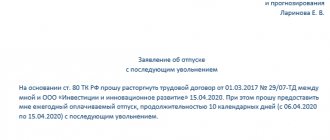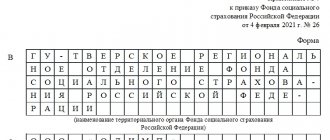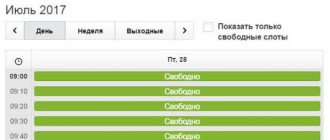The employee decided to quit, but did not have time to take vacation this year. In this situation, there are two scenarios: he can receive compensation for unused vacation, or he can use his vacation before dismissal. By and large, there is not much difference for the employer, but when providing an employee with leave followed by dismissal, you need to know some features, which we will discuss in this article.
According to Art. 127 of the Labor Code of the Russian Federation, upon a written application from an employee, unused vacations may be granted to him with subsequent dismissal. The first thing to note is that the employer is not obliged to provide the employee with such leave, but can provide it if he considers it necessary or meets the employee’s needs. Therefore, even if the employee’s vacation is already approaching, for example, according to the schedule, it begins on August 15, and the employee asks for vacation followed by dismissal from August 12, the employer is not obliged to satisfy such a request. In such situations, it is easier for an employee to go on vacation according to the schedule and then write a letter of resignation.
Now let’s move on to the specifics of granting leave with subsequent dismissal.
Benefits of the application
This form of application gives obvious preferences to the employee who has decided to resign. The main thing is the time that he gains to look for a new job without losing his seniority and without having to work the required two weeks. For the employer, there are fewer advantages in this situation, but they also exist - the law is followed, more time remains to find a new employee, and good relations with the former subordinate are maintained.
- Form and sample
- Free download
- Online viewing
- Expert tested
FILES
How to leave an organization without work
When submitting a letter of resignation after returning from vacation, you can resign without working for several reasons:
- By agreement with management. If the company does not need the services of a citizen, then the work may not be assigned.
- If the employer violates labor laws.
- If there are compelling reasons. Deteriorating health, a spouse's long business trip associated with a family move, and other reasons can lead to a quick dismissal. The employer may require supporting documents.
- Certain benefits are provided for pregnant women and parents of large families.
The legislative basis for interaction when setting a working period is primarily Art. 80 Labor Code of the Russian Federation.
Requirements that must be met during vacation followed by dismissal
Despite the apparent simplicity, in order for the dismissal to take place legally, it is necessary that certain conditions be met. In particular, it is necessary that the employee has unused vacation, and the employer does not object to him taking time off before dismissal. In addition, dismissal in this way is possible only at the initiative of the employee and only if he did not commit any serious offenses or violations that led to dismissal.
An important condition: even if the employee has not worked for a full year, with this form of dismissal the employer is obliged to provide him with leave of at least 28 days (according to the calendar).
True, only those days that would need to be paid during a standard dismissal are subject to payment.
Should an employee work
You should receive a warning from the employee that he wants to leave soon. But there are circumstances that give him the opportunity to independently choose the day of dismissal and not work for 2 weeks.
- Reaching retirement age. If an employee works while a pensioner and wants to quit, he is also not required to work.
- Enrollment in a full-time department of an educational institution.
- Transfer of the husband (wife) to a new workplace, and consequently, moving to another city or country.
- Change of residence to another city or country.
- Caring for a sick family member or a child under 14 years of age;
- Health problems.
- When authorized bodies (prosecutor's office, labor inspectorate) identify delays in wages, refusals to grant vacations and other violations of labor law. If the court finds a violation of labor laws, and you refused to dismiss the employee within the specified period, you will have to pay a fine.
- In addition, a pregnant woman or a conscript may leave the workplace without complying with the warning deadline. Under these circumstances, the employee must provide evidence. For example, an order to enroll a student in a university.
It is convenient to maintain personnel in the system
“Accounting is a convenient program. Thanks to the developers. I have been working with Kontur for a long time. And it’s convenient to manage personnel; you’ll never miss anything in payroll. Taxes are calculated on their own. All reports reach the recipient on time. Everything is updated with the times. I really like it, everything is convenient. And when something is unclear, you can call - and they will always come to your aid. Thanks again to the developers."
Natalia Abbasova, accountant, senior Veshenskaya, Rostov region.
If the employer does not want to sign such a statement
In most cases, the employer has every right to refuse an employee to use vacation before dismissal. But exceptions are possible. For example, if the vacation time followed by dismissal completely coincides with the vacation period assigned to the employee according to the vacation schedule approved by the enterprise. Also, the employer will be required to agree with the employee’s decision when a clause on such leave is in the dismissal agreement concluded between these two parties.
Who is provided with an additional one upon termination of the contract?
Labor legislation regulates additional paid leave upon dismissal, which is provided to certain categories of employees (Articles 116 - 119 of the Labor Code of the Russian Federation, other norms of labor legislation and Federal Law):
- working in harmful or dangerous conditions;
- working in the Far North;
- employees receiving higher education in the Western Federal District or the Russian Federal District (for the period of the session);
- disabled people (basic leave increases to 30 days), etc.
Upon termination or termination of a contract, an employee who decides to exercise his right to rest in kind may:
- ask for complete rest (basic + additional);
- ask for one of the vacations, and compensate the second one financially.
In the latter case, the settlement note in Form T-61 will indicate the amount for unused days.
Dismissal procedure
The process of terminating an employment contract with prior use of vacation has a multi-stage structure.
- First of all, the employee must write the application . If this procedure is carried out as a result of reaching an agreement on dismissal between the employer and the employee, this document must also be drawn up properly.
- Next, the head of the organization issues orders on the employee’s leave and dismissal. The person being dismissed must be familiarized with both of these documents, and with the order of dismissal, even before going on vacation.
- Also, before the vacation, the employee is given the settlement payments in full and a work book . The employment date of dismissal must indicate the last day of vacation.
- Then all the necessary information is entered into the employee’s personal card and other personnel records.
Nuances
If an employee falls ill during vacation time, the date of his departure from his position remains the same. But the employer pays sick leave within the period established by law.
When the date of departure falls on a weekend or holiday, the date of leaving the position is considered to be the previous day. In this case, it is necessary to pay and issue the necessary documents on the last day of work before going on vacation.
For example, if the last day of vacation falls on April 22, and this is Sunday. Then you need to fire on the 22nd, but pay the employee before he leaves for the rest period.
It must be remembered that the employee has the right to withdraw the submitted application before the start of his vacation period.
Rules for drawing up an application for leave with subsequent dismissal
A unified, legally established sample of such a statement has not been developed; therefore, employees can write it in free form. The main thing is to adhere to certain standards and follow spelling rules.
The document must indicate the name of the organization, full name and position of the specific employee to whom the applicant is applying (usually the director or general director), as well as the date from which the employee would like to go on vacation.
It should also be noted that the vacation is planned with subsequent dismissal.
The document can be prepared either in printed or written form, but in any case it must be certified by a “living” signature. It is drawn up in two copies, one of which remains in the hands of the employee, and the second is transferred to the employer’s representative.
How to resign of your own free will after maternity leave
At the current legislative level, there is no concept of “maternity leave”. This definition arose and became entrenched in the public consciousness after the adoption in 1917 of the Decree establishing the right of women to receive benefits for a certain period before and after childbirth. Currently, maternity leave at the household level is understood as a set of leaves for pregnancy and childbirth, for caring for a child up to one and a half years old, and for caring for a child up to three years old.
There is a direct prohibition on dismissing an employee who is on maternity or child care leave, except in exceptional circumstances. The restriction does not apply to the citizen’s own desire to end the relationship.
The procedure for dismissing an employee on maternity leave does not differ from the generally accepted one. When a resignation letter is written and submitted to the personnel service at least 14 days before leaving leave, the employee does not need to begin performing his job duties.
Read more: “Resign after maternity leave.”
An example of drawing up an application for leave with subsequent dismissal
The document has a fairly simple form and its preparation should not cause much difficulty.
- First, the addressee of the application , namely, the full name of the employing company (in accordance with registration documents), the manager (the position is indicated according to the staffing table), as well as his last name, first name, and patronymic. Then the employee data . After this, the word “Statement” is written in the middle of the line.
- The main part of the document must include a request for annual paid leave, indicating its period (start and end date), as well as duration. You also need to formulate your desire to quit immediately after the end of your vacation.
- Finally, the application must be signed and dated.
Vacation granted, but not worked out
In practice, it is quite common for an employee to go on vacation for the next working year without having earned it yet.
For example, an employee has been working since May 12, 2018. In 2021, he fully used 28 days of allotted vacation for the working year 05/12/2018-05/11/2019. The next scheduled vacation is scheduled for June 2021. Regarding the working year 05/12/2019-05/11/2020, this will be leave provided in advance. An employer cannot refuse an employee to use all 28 days of vacation at once. The employer has the right not to agree to leave of longer duration.
If this employee expresses a desire to resign before the end of his working year, then the employer, in accordance with Article 137 of the Labor Code of the Russian Federation, has the right to withhold payment for unworked vacation days. The employee's consent to such retention is not required. However, Article 138 of the Labor Code of the Russian Federation limits such deductions to 20% of the amount payable. The employer has the right to voluntarily refuse withholding. Otherwise, amounts exceeding the established limit may either be withheld with the written consent of the employee, or recovered in court.
Withholding payment amounts for used but unworked vacation days from an employee’s salary can be interpreted in different ways:
- how to withhold from an employee the amounts of payment for used but unworked vacation days;
- as a refund by an employee of excessively accrued vacation pay.
On the one hand, Article 137 of the Labor Code of the Russian Federation states that the employer can make a deduction from the employee’s salary. There are two key words to pay attention to: “hold” and “may.” Considering this type of calculation to be withholding, it cannot be regarded as income and cannot be included in the calculation base for personal income tax and insurance premiums. Therefore, no compensation can arise. Let us add that even if the funds are withheld, the employee will receive non-refundable income in the form of vacation days, which is simply impossible to return. This is due to the fact that information about the days included in the length of service as part of the main vacation has already been transferred to the Pension Fund.
The word “may” used in the Labor Code, in contrast to the word “shall,” indicates that it is up to the employer to decide whether to apply this deduction or not. The employer has the option not to exercise this right.
On the other hand, there was an excessive accrual of vacation pay to the employee due to the fact that he quits without completing the working year. And these amounts should be reflected in the accounting records as reversals. Consequently, when reversing excessively accrued vacation pay, the employer must return the excessively withheld personal income tax to the employee and reduce the calculation base for insurance premiums. Reversal due to recalculation is not a withholding, and therefore does not entail the restrictions listed in Article 138 of the Labor Code of the Russian Federation.
| 1C:ITS For more information about reflecting deductions for unworked vacation days upon dismissal, including in 1C programs, see the section “Instructions for accounting in 1C programs.” |
To avoid disputes, the adopted calculation methodology must be enshrined in local regulatory documents and reflected in the settings of the 1C: Salaries and Personnel Management 8 program, edition 3.
Is it possible to withdraw such a statement?
The law allows an employee of an enterprise to withdraw such a statement, but only if this is done before the start of the vacation . This is due to the fact that the entire dismissal procedure is carried out before the employee goes on vacation; accordingly, starting from the first day of vacation, the employment relationship with him is actually considered severed.
Also, the employer has every right to refuse to withdraw an application if a replacement has already been found to replace the person being dismissed and the person who received the job offer cannot be refused for certain reasons prescribed by law.
Which article of the Labor Code of the Russian Federation regulates working out 2 weeks upon dismissal in 2021 - 2021
Probably every working person knows about such a stage of dismissal as working off.
It is worth noting that the concept of working off is not given in the legislation. It is often confused with the employer’s warning period about upcoming dismissal. Following Art. 80 of the Labor Code of the Russian Federation, an employee is obliged to inform the employer in writing about his decision to leave 14 calendar days before the date of dismissal. But the Labor Code of the Russian Federation does not indicate that an employee is required to work on these days. Having decided to change jobs, a person may wonder: is it possible to leave without working? The answer to this can be found in Art. 80 of the Labor Code, as well as the established practice of personnel officers and courts.
ConsultantPlus experts spoke in detail about the procedure for working out upon dismissal of one's own free will. Get trial access to the K+ system and upgrade to the Ready Solution for free.
Payments
Since the termination of labor interactions at the will of the employee is a positive reason, he is entitled to all payments:
- Salary calculated per day of care;
- Reimbursement for unused vacation time (if any);
- Bonuses and incentive payments provided for in the employment contract.
If a citizen has used vacation without working the required period, deductions will be made to him upon final payment. The procedure and terms of calculation are regulated by Art. 140 Labor Code of the Russian Federation.
Payments can be made in cash through the company's cash desk or by transfer to a citizen's salary card. It is not allowed to transfer wages to a card registered to a third party, even with a written application from the dismissed employee.







